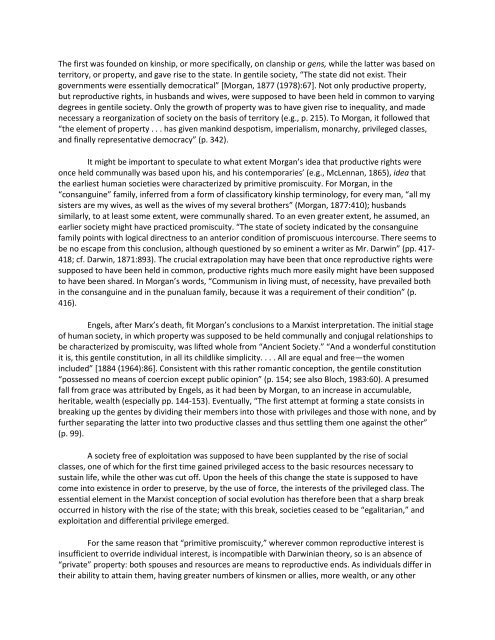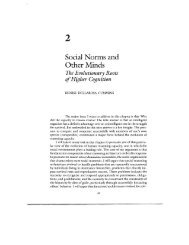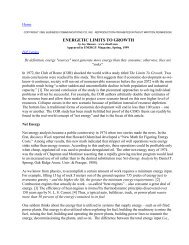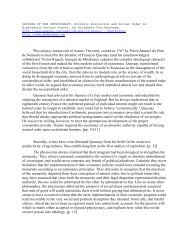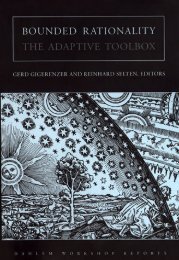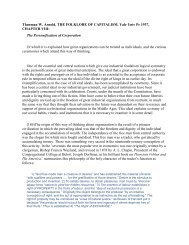DESPOTISM AND DIFFERENTIAL REPRODUCTION: A Darwinnian ...
DESPOTISM AND DIFFERENTIAL REPRODUCTION: A Darwinnian ...
DESPOTISM AND DIFFERENTIAL REPRODUCTION: A Darwinnian ...
Create successful ePaper yourself
Turn your PDF publications into a flip-book with our unique Google optimized e-Paper software.
The first was founded on kinship, or more specifically, on clanship or gens, while the latter was based on<br />
territory, or property, and gave rise to the state. In gentile society, “The state did not exist. Their<br />
governments were essentially democratical” [Morgan, 1877 (1978):67]. Not only productive property,<br />
but reproductive rights, in husbands and wives, were supposed to have been held in common to varying<br />
degrees in gentile society. Only the growth of property was to have given rise to inequality, and made<br />
necessary a reorganization of society on the basis of territory (e.g., p. 215). To Morgan, it followed that<br />
“the element of property . . . has given mankind despotism, imperialism, monarchy, privileged classes,<br />
and finally representative democracy” (p. 342).<br />
It might be important to speculate to what extent Morgan’s idea that productive rights were<br />
once held communally was based upon his, and his contemporaries’ (e.g., McLennan, 1865), idea that<br />
the earliest human societies were characterized by primitive promiscuity. For Morgan, in the<br />
“consanguine” family, inferred from a form of classificatory kinship terminology, for every man, “all my<br />
sisters are my wives, as well as the wives of my several brothers” (Morgan, 1877:410); husbands<br />
similarly, to at least some extent, were communally shared. To an even greater extent, he assumed, an<br />
earlier society might have practiced promiscuity. “The state of society indicated by the consanguine<br />
family points with logical directness to an anterior condition of promiscuous intercourse. There seems to<br />
be no escape from this conclusion, although questioned by so eminent a writer as Mr. Darwin” (pp. 417-<br />
418; cf. Darwin, 1871:893). The crucial extrapolation may have been that once reproductive rights were<br />
supposed to have been held in common, productive rights much more easily might have been supposed<br />
to have been shared. In Morgan’s words, “Communism in living must, of necessity, have prevailed both<br />
in the consanguine and in the punaluan family, because it was a requirement of their condition” (p.<br />
416).<br />
Engels, after Marx’s death, fit Morgan’s conclusions to a Marxist interpretation. The initial stage<br />
of human society, in which property was supposed to be held communally and conjugal relationships to<br />
be characterized by promiscuity, was lifted whole from “Ancient Society.” “And a wonderful constitution<br />
it is, this gentile constitution, in all its childlike simplicity. . . . All are equal and free—the women<br />
included” [1884 (1964):86]. Consistent with this rather romantic conception, the gentile constitution<br />
“possessed no means of coercion except public opinion” (p. 154; see also Bloch, 1983:60). A presumed<br />
fall from grace was attributed by Engels, as it had been by Morgan, to an increase in accumulable,<br />
heritable, wealth (especially pp. 144-153). Eventually, “The first attempt at forming a state consists in<br />
breaking up the gentes by dividing their members into those with privileges and those with none, and by<br />
further separating the latter into two productive classes and thus settling them one against the other”<br />
(p. 99).<br />
A society free of exploitation was supposed to have been supplanted by the rise of social<br />
classes, one of which for the first time gained privileged access to the basic resources necessary to<br />
sustain life, while the other was cut off. Upon the heels of this change the state is supposed to have<br />
come into existence in order to preserve, by the use of force, the interests of the privileged class. The<br />
essential element in the Marxist conception of social evolution has therefore been that a sharp break<br />
occurred in history with the rise of the state; with this break, societies ceased to be “egalitarian,” and<br />
exploitation and differential privilege emerged.<br />
For the same reason that “primitive promiscuity,” wherever common reproductive interest is<br />
insufficient to override individual interest, is incompatible with Darwinian theory, so is an absence of<br />
“private” property: both spouses and resources are means to reproductive ends. As individuals differ in<br />
their ability to attain them, having greater numbers of kinsmen or allies, more wealth, or any other


